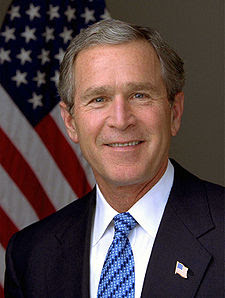 A few months ago, a friend started a conversation with the words, “now that George Bush is generally agreed to be the worst president in history…”
A few months ago, a friend started a conversation with the words, “now that George Bush is generally agreed to be the worst president in history…”
I have no idea what she said after that, as my mind was reeling. I silently edited the statement: “Among partisan Democrats who ignore Warren Harding, George W. Bush is generally agreed to be the worst president in history.”
But my friend can point to academic support for her claim, because even some historians, who should know better, have been eager to label George W. Bush the “worst president in history.” They would do well to let some history occur before they presume to speak for the ages, and to remember how Ronald Reagan evolved in a few short years from the bumbler of the Iran-Contra scandal into the hero who won the Cold War.
At Pajamas Media, Ron Radosh discusses an academic who is grappling with the issue of Bush’s legacy:
As Professor Moen points out, Bush’s “ability to actually stay convinced that Iraq had to be won, when nobody else in the world agreed with him…is an aspect of his strong leadership that people will respect more over time.†One can argue that when Bush leaves office, Iraq will be on the way to forging an actual democracy; the war will have been effectively over and Al-Qaeda will have been defeated.
This is not to say that critics are incorrect when they attack the serious mishandling of Iraq after Saddam’s ouster. No one can justify Abu Ghraib, the excesses in interrogation techniques and the sanction of actual torture, or the problems at Guantanamo. Nor can one fail to be critical of the President’s inability to explain to the American public why Iraq had to be won and why they should support Operation Iraqi Freedom.
Future generations will have to assess the final outcome. If Iraq does emerge as a democracy in the Middle East, joining Israel as a state pledged to democracy in a sea of tyrannies, then future historians will see the President in a more favorable light than their contemporaries seem to do today. Whatever their conclusions turn out to be, I have one prediction: Bush’s position in the rankings of American Presidents will have risen close to the center. Check back with me in a decade.
I think it may take longer than a decade, and in any event it will depend on the future course of Iraq and the Middle East. Today, after mismanaging the war for years, Bush can point to a tenuous, fledgling democracy in Iraq. Twenty or forty years from now, if things go well, he may — may — get credit for creating the first stable democracy in the heart of the Arab Middle East. And if Iraq becomes a beacon of hope in the neighborhood, the missteps in the early years of the war will become a mere footnote in the history books.
